- Home
- Brian Garfield
The Vanquished Page 7
The Vanquished Read online
Page 7
“That’s exactly why I did ask you. Tell me, what precisely is your position?”
“Scout and guide,” Douglas said. “I’ve been over the ground before.”
“Yes. With William Walker.” Smiling his round-cheeked smile, Zimmerman pocketed the notebook and pushed away. “I’ll see you gentlemen later.”
“Obliged for the coffee,” Charley said. He caught the correspondent’s nod and watched him leave. Norval Douglas said, “I wonder what he gets out of this kind of thing?” and left the bar too, leaving Charley alone with his coffee. It was amazing, he observed, how little anyone could know about anyone else. The coffee had cooled down and he sipped at its tepid strength. In a far part of the saloon he saw two large figures—Bill Randolph and Chuck Parker. A crowd of recent memories washed through him and in a moment he found himself thinking of Gail with a strange mixture of compassion and anger. The pale light from windows and chandeliers made a flat, almost vapid choleric un-healthiness of everyone’s flesh. Charley retreated in stiff silence from the room.
There was no one below decks. He stood by his hammock and after a moment dragged out his carpetbag. The men in the saloon, he had noticed, were most of them armed. He tugged the belted revolver out of the bag, strapped the holster on, and held the gun in his hand, balancing its unfamiliar weight. The long octagonal barrel was crisp and smooth and straight; there was something clean and positive about it. He loaded it methodically. Dropping the hammer between two chambers, he hefted the gun and found it heavier than it had been. The weight of armed power amplified the two-and-a-half pounds of the gun. He slid his palm over the smooth hardwood grip and balanced the barrel over his crooked elbow, taking aim at a porthole, squinting with one eye over the tiny brass bead of the front sight. He imagined enemies balanced over that sight—Indians, breech-clouted, leaping; Mexicans in battle dress; Bill Randolph in a soiled white apron. He pulled the trigger. The hammer was down; nothing happened; but in his imagination he felt the hard kick against his palm and saw the drift of clouded powder-smoke and the pitching of his stricken enemy. His eyes grew wide in the musty dimness of the hold. He holstered the gun and buttoned the flap over it, and went up the ladder with his shoulders straight and his eyes level and half-shuttered, in imitation of Norval Douglas.
The Sea Bird swayed gently, paddlewheels thrumming the water. Smoke columned behind them like a trailing flag. The colors of the ocean were gray and green and brown-blue, with now and then a fleck of white toward the distant coastline. That shore was a ragged uplift of rocks and sharp-sloping timber, gnarled flatheaded cypresses and oak.
There was a man on deck at the rail. He offered Charley a cigar, then lit his own pipe and introduced himself: “My name is John Edmonson.” He spoke in carefully modulated tones, precisely pronounced; he seemed to be an educated man from far away. His cheeks were stubbled with gray, his lean face deeply lined. He had a long straight nose and mild eyes that made him appear gentle and thoughtful; there were two horse-pistols in his waistband. He appeared old. He said, “Have you ever stopped to wonder about the sea? I wonder what might be hidden underneath that surface. A good many mysteries, I suspect.”
“Sharks,” Charley said. “And stingrays.”
“I should have thought,” Edmonson murmured, “that a youth like yourself would have plenty of time yet to turn into a cynic.”
“Into what?”
“A cynic,” the older man said, “is a man who believes the worst of everything—and by the same token, believes in nothing.”
Charley thought that was a fairly accurate description of himself. He saw nothing wrong with it; life came to him that way, in hues of black and gray. He spoke with customary bluntness: “You seem a little tame for this war party.”
“Perhaps I am. Perhaps a few tame old men are needed among us.”
“It’s bound to be a hard trip.”
“My bones aren’t so old yet that I can’t ride horseback,” Edmonson said with a friendly smile. His voice was a gentle husky buzz. Under the rim of his flat-crowned California hat his hair stuck out in unruly licks of pebbled gray. He was tall, not bent. The sea traveled past without changing. “I feel the need for lunch,” Edmonson said. “Join me?”
“All right.”
Over the meal, the old man talked mildly of remembered things. He was a New Englander, and his nostalgic conversation evoked in Charley’s mind fanciful pictures of places he had never seen. Edmonson’s family, once wealthy enough to educate him, had seen the coin turn; his father, he said, had gone bankrupt and died soon after. Edmonson revealed that he had studied for the law, but ill health in the form of lung consumption had driven him West. His body had healed. The need to earn a living had kept him at the carpenter’s trade; thus the calluses on his palms. He had never owned the talent for accumulating money. Approaching age had turned his thoughts toward a home, and Crabb had promised that—land on which to settle. He said, “I believe the prospects of danger are not nearly so great as some of us would believe. And where men will build homes, they will have need of a carpenter. I’ve found it a satisfying livelihood.”
“Is that all you want out of it?” Charley asked.
“What do you mean?”
“I don’t know,” Charley said. “It just seems to me there ought to be something more than just making a living with your hands.”
“It’s more than sufficient to keep a man content. To demand more out of life is to delude yourself. In time you may learn that, my young friend.”
“Maybe.”
“What more would you have out of life?”
Charley would have to consider that. He made no immediate answer. After a while Edmonson said, “There’s another young man aboard, about your age. His name is Chapin. I found him singularly uncommunicative. Have you met him?”
“No.”
“I’ll be curious to see what you make of him.”
“All right,” Charley said absently. He felt no particular interest. Presently he finished his meal and left Edmonson to his pipe, and walked once more onto the deck.
During the afternoon he spent an hour watching a dice game in the steerage, visited the engine room and stood deafened by the thump and hiss of the great pistons and watched the stokers move steadily with their shovels, men with glistening torsos and massive arms. Afterward he moved restlessly about the ship. Twilight came in shifting layers over the sea and the Sea Bird rocked gently, big paddlewheels churning, engines thrumming. The coastline was somewhere out of sight off the port side. A brittle cold wind came off the ocean but Charley stood fast in the twilight after supper, holding the rail with numb fingers and staring into the darkening colors of the sea. He was beginning to know the fear of uncertainty: Why had he come?
Violet and cobalt dusk, and up above on the Texas deck some-one lighted collision lanterns. Silence enveloped Charley. His face, long and spare of lips, grew sharp, reserved, bitter.
After a stretch of time gray Jim Woods came up from below decks, made one turn about the rail, remarked to Charley about the cold, and went back inside. A crewman came along checking the lifeboat lashings; storm clouds were visible in the southwest. Overhead the captain came out of the wheelhouse and stood with the wind in his face, rubbing his arms. A cabin door opened a little way down the deck and he watched the correspondent, Zimmerman, leave that stateroom and come down the deck toward him. As Zimmerman passed alongside, Charley said, “Evening.”
Zimmerman started. He looked into the shadows. “Oh—hello, Evans,” he muttered, and went down the stairwell into the saloon.
Charley frowned. His eyes put themselves on the lighted glass of the wheelhouse; the captain turned back inside after shooting the sky with a sextant. The door beyond Zimmerman’s state-room opened and Charley was surprised to see a woman’s shape emerge—no, it was a girl’s. The girl came forward and Charley bit his lip—she seemed to bear a strange resemblance to Gail. Her hair was tawny. He stepped out of the lifeboat’s shadow, startling her, and
introduced himself, using Zimmerman’s name; he said, “He told us he had a sister on board. You’d be Miss Zimmerman?”
“Why,” she said, “yes.”
“Going for a walk on deck, ma’am?”
“Yes, I was.” Her voice and expression were uncertain.
He stepped back. “I’m sorry. I didn’t mean to bother you.”
She nodded and went on; a short time later she reappeared at the far end of the deck, having made a circuit of the boat, and he watched her come forward. He expected her to go back into her cabin, but she did not. She came on and said to him, “You look half frozen.”
“I’ll go below. There’s a stove in the saloon.”
“No,” she said abruptly. “Come with me—get dry by the stove. Really, you must.” She turned about and walked back to her cabin, and turned again to see if he was following. Frowning, alert but unsure, he went after her and stopped in the door, looking down. “I didn’t mean to bother you.”
The girl reached forward and pulled him gently inside, closing the door behind him. Her smile was open and frank; but it went away suddenly and she blushed. “I wonder what made me do that?”
She was, he guessed, not much older than he was. “You’re shivering,” she said, and moved him toward the little round stove in the room’s corner. Its isinglass window glared redly. “Take off your coat,” she said. “Why, you’re soaked with spray. How long were you on deck?”
“Longer than I thought.” He shouldered out of his coat and stood bent over the stove, welcoming its warmth. “I’m always doing stupid things like that.”
“What’s your name?”
“Charley Evans.”
“I’m Helen.”
“Hello,” he said; his back was still to her, but now he turned to warm his legs and buttocks, and lifted his hand to sweep damp hair out of his eyes. The girl said, “I suppose you shouldn’t be here with the door closed.”
“You’re right. I’d better go.”
“No,” she said. “You’ll freeze if you go out again. Besides, my brother keeps busy with his interviews and I have no one for company. I like having someone to talk to.”
“Why,” he said, “so do I.”
“There can’t be anything wrong with that,” she said firmly, and glanced at the closed door. Lamplight cast shadows under her brows; he could not make out the color of her eyes. Her face was oval and pleasant. She wore a long brown skirt and a white waist. He saw rising interest in her eyes; he let himself smile.
CHAPTER 8
“After that,” Charley said, “I took On Ed’s chores. He was six years older then, so naturally he was a lot bigger—it about broke my back at first, but after a while I learned how to handle everything. The old man didn’t do much but drink, and my mother quit talking altogether. The place got pretty rundown, because I couldn’t keep it up all by myself, and the old man didn’t do much work at all, he just went back to his Bible and his bottle, and I got to figuring that I didn’t have an old man at all—just an old drunk I had to support. I packed up and left when I was thirteen. The old man was pretty bad off with the whisky sickness.”
“What happened to them?” the girl said.
“It doesn’t much matter, does it? Maybe they’re still on the same old farm, him drinking and her crying.” He stopped quickly. How had she drawn him out? He remembered Gail and he regretted having confided in this woman.
Her lips were pursed; she looked up in a faraway manner. “What have you done since then?”
He shrugged. “Worked. Odd jobs, town to town.”
“It makes my life sound so sheltered and dreary,” she said.
Lamplight flickered across his face frostily. His lips were pressed together. He didn’t want to talk more about himself. “What about you?” he said. “What are you doing on this boat?”
“Our parents died last month,” she told him. “There was nowhere else to go. My brother brought me with him. I’m taking the Sea Bird around to the East. I’ll go to school, I suppose.”
“How old are you?”
“Seventeen.”
“I’m eighteen,” he lied. He picked up his coat from the bunk and held it near the fire to dry it out; he aimed a slantwise look at the girl and saw color come slowly to her cheeks. Her hair fell carelessly about her shoulders and a smile lay in suggestion behind the composure of her lips. Her body was rounded, a little heavy, and sight of it fed his desires. “Maybe I’d better get below,” he said.
“Stay just a little longer.”
She was neither a whore nor a barmaid. He gave her a quiet stare and moved toward the door, sliding his arm into the coat. The girl, sitting on her bunk, threw her head back so that he could see the throbbing of her throat and the pale blue of her eyes. When he opened the door a frigid wind met him in the face. He said, “Maybe I’ll see you tomorrow.”
“Yes.”
“Thanks for listening.”
“I liked it.”
He went out, pulling the door shut behind him. Light beads of sweat were cold on his forehead. He stood just outside the door, hand on the latch, watching the dappled surface of the moon and the glistening reflections of the sea; the engines rumbled and the packet’s deck swayed with the motion of the seas, and a man’s figure came up from the saloon—Zimmerman. Obviously recognizing Charley, he advanced with a swelling rush and said angrily, “What were you doing in there?”
“Talking. Thawing out.”
“Hell,” Zimmerman said. His smooth round cheeks were dark. He moved in on Charley stiff-armed. The blow caught Charley under the heart and staggered him; he found himself falling across the deck into the rail. Instantly there was rage; he came back, swinging clumsy round blows toward Zimmerman and smelling the stink of whisky on the correspondent’s breath—his fist hauled up from the waist and cracked Zimmerman’s lips; and that was all.
It amazed him. Zimmerman fell back with a dull sound against the cabin wall, and stood there dazed, fingering his jaw. His free hand waggled and he said, “All right—all right. Enough.” He worked his jaw back and forth with his hand. The door opened and the girl was outlined there, talking quickly, asking questions which no one answered. Zimmerman said, “Sorry, Evans. I was drunk. No hard feelings?”
“No,” Charley said, “I guess not.” He looked into the girl’s eyes and saw puzzlement there; he turned his collar up and went away, amazed by how easy it was to get the better of some men.
Restless and warmed by exertion, he made a tour around the deck and went below. He picked his way past card games and sleeping drunks to his hammock, and took some time getting used to the bent swaying position he had to assume; then he was asleep quickly.
Rough seas wakened him at four in the morning, and he spoke a number of oaths while untangling himself from the swinging hammock. Several lurching men staggered toward the rear bulk-head, looking very sick in the weird lunging light thrown by the swinging lamps. Someone threw the bulkhead door open and the line of green-faced men plunged through toward the ladder. Charley swore again and braced himself against a post. Nearby a loose-hanging lantern heaved back and forth, and had the effect of upsetting his balance by constantly shifting the shadows. Men were shouting and bodies rolled past him in what seemed to be aimless directions. Sea smell was strong. A little pool of water moved back and forth near his feet. Old John Edmonson came by with a sickly smile, said, “I don’t believe I was cut out for this,” and made his way to the ladder. Across the room, Charley saw Norval Douglas and Jim Woods give up their attempt to continue a card game. Two or three men came back down from topside, very pale, and one of them said, “It’s worse up there. The damned boat’s upside down.” Over it all was the smash of water against the decks and the steady imperturbable thrum of the engines.
A man Charley knew from Tuolumne County, Sam Kimmel, rocked past him and bumped into the massive lurching body of Chuck Parker, and Sam Kimmel stopped abruptly, wiping his lips. “Here you are, you son of a bitch.”
&nbs
p; Parker wheeled ponderously. “What?”
“I’ve been looking for you.”
Men were cursing and wheeling about the cabin. Kimmel stood fast, a small one-eyed man with an embittered expression, stubbornly ignoring the ship’s vast movements; Kimmel said in precisely enunciated words, “You Goddamned son of a bitch. I figured to catch up to you one day, you thieving bastard.”
Charley watched with mixed fascination and fear. Parker’s hot round eyes sizzled against Kimmel. The lamps whirled and shadows danced. The boat’s bottom struck a trough of water, jarring everyone loose, and Charley pitched down the steeply sloping floor until the bulkhead stopped him hard. When he looked back he saw an intertwined crawling mass that slowly took shape and became eyes and arms and legs. Out of that confusion stepped Norval Douglas. He braced himself against the wall by a porthole. The boat rolled over and the mass of bodies separated. Chuck Parker was still rooted by his hammock. His face was distorted with wrath; he bore down mightily upon the slight form of Samuel Kimmel, and then Kimmel pulled a pocket-pistol from somewhere and trained it uncertainly on Parker and shouted above the din of sea and storm: “You’ve got this coming to you, damn you!” Parker stopped in his tracks and Norval Douglas pushed forward, palming his own revolver. Once again the waves parted and the ship plunged downward, heeled over. Charley scratched for a grip. Dimly he heard the report of a gunshot, and when the boat slowly righted itself he saw Chuck Parker with one leg buckling under him, dropping to the deck. He lifted himself to one elbow and looked down and said, in a stupid voice, “You put a slug in my leg. What for?”
Kimmel stumbled forward and knelt by him. His single fevered eye peeredat the injured leg. “Jesus. I didn’t really mean to pull the Goddamn trigger.”
Parker’s sluggish features turned petulant. He glared at the black eyepatch. Kimmel said, “I’m sorry”—Charley saw his lips form the words. Norval Douglas was leaning down over Parker. Kimmel got up. “I’ll find Dr. Oxley. Stay put, Parker.”

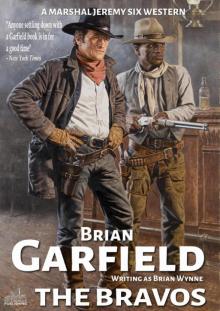 Marshal Jeremy Six #3
Marshal Jeremy Six #3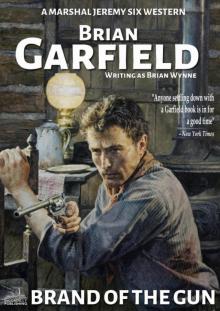 Marshal Jeremy Six #6
Marshal Jeremy Six #6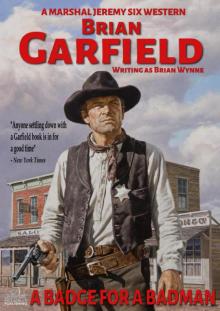 Marshal Jeremy Six #5
Marshal Jeremy Six #5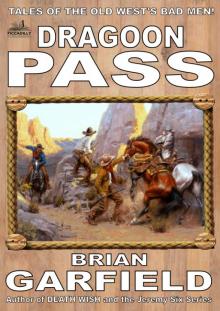 The Outlaws 2
The Outlaws 2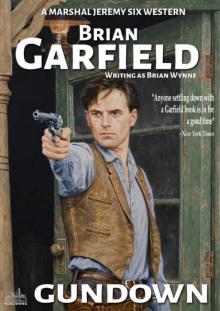 Marshal Jeremy Six #7
Marshal Jeremy Six #7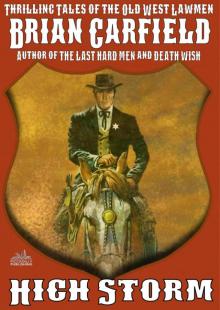 The Lawbringers 4
The Lawbringers 4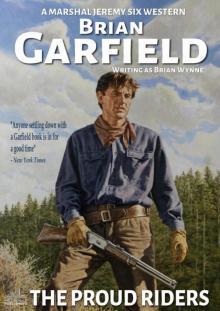 Marshal Jeremy Six #4 the Proud Riders
Marshal Jeremy Six #4 the Proud Riders The Romanov succession
The Romanov succession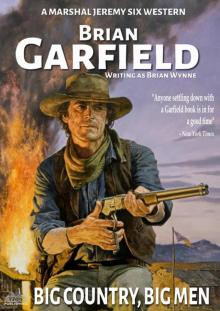 Marshal Jeremy Six #8
Marshal Jeremy Six #8 Sliphammer
Sliphammer Line of Succession
Line of Succession Deep Cover
Deep Cover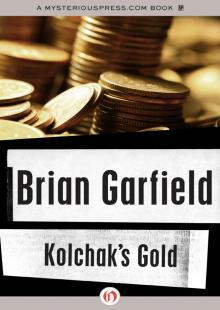 Kolchak's Gold
Kolchak's Gold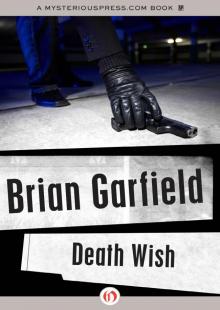 Death Wish
Death Wish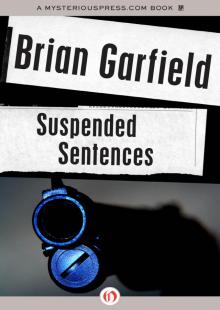 Suspended Sentences
Suspended Sentences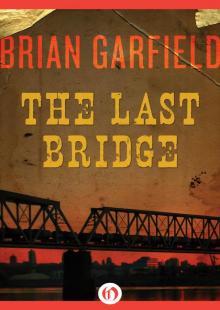 The Last Bridge
The Last Bridge Relentless
Relentless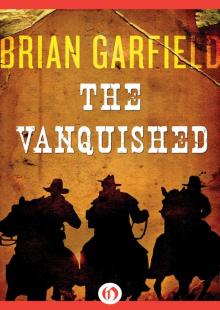 The Vanquished
The Vanquished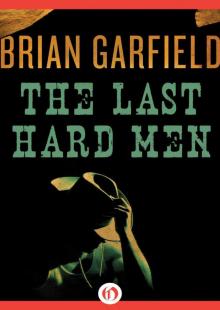 The Last Hard Men
The Last Hard Men Hit and The Marksman
Hit and The Marksman Villiers Touch
Villiers Touch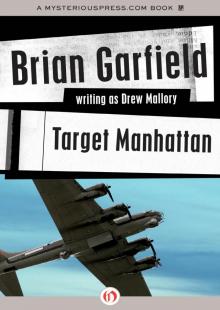 Target Manhattan
Target Manhattan Marchand Woman
Marchand Woman What of Terry Conniston?
What of Terry Conniston?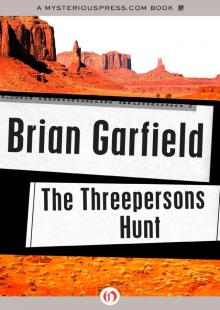 Threepersons Hunt
Threepersons Hunt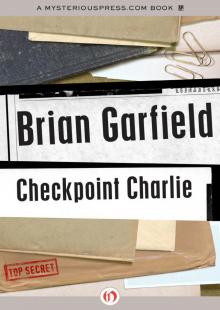 Checkpoint Charlie
Checkpoint Charlie Romanov Succession
Romanov Succession Necessity
Necessity Death Sentence
Death Sentence Fear in a Handful of Dust
Fear in a Handful of Dust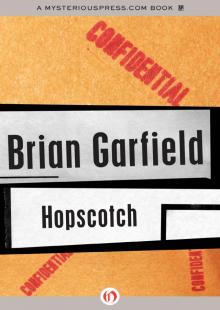 Hopscotch
Hopscotch